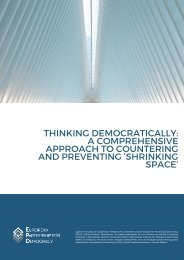Repression and resilience: Diagnosing closing space mid-pandemic
Create successful ePaper yourself
Turn your PDF publications into a flip-book with our unique Google optimized e-Paper software.
REPRESSION AND RESILIENCE: DIAGNOSING CLOSING SPACE MID-PANDEMIC<br />
27<br />
the emergence of alternative voices <strong>and</strong> a renewed<br />
dem<strong>and</strong> for fundamental rights, accountability <strong>and</strong><br />
good governance from citizens. There the crisis has<br />
galvanised global activism <strong>and</strong> campaigning to push<br />
for radical change to social, economic, <strong>and</strong> political<br />
models - as exemplified by Black Lives Matter <strong>and</strong> other<br />
movements. 97 This was also the case in Kenya, where<br />
the misuse of public funds intended for the p<strong>and</strong>emic<br />
response brought renewed citizen activism <strong>and</strong> unity in<br />
the call for social justice <strong>and</strong> anti-corruption that shook<br />
the political l<strong>and</strong>scape. Citizens called for accountability<br />
on the use of COVID funds in large numbers with social<br />
media posts under the hashtag #MoneyHeist, putting<br />
the government under unprecedented levels of public<br />
scrutiny.<br />
In line with this renewed democratic vitality on the side<br />
of citizens, Kenyan civil society performed a watchdog<br />
role over the government during the p<strong>and</strong>emic by<br />
petitioning for access to information on procurement<br />
processes, organising marches against police brutality<br />
<strong>and</strong> participating in local decision-making processes<br />
on the p<strong>and</strong>emic-response. Civil society also monitored<br />
<strong>and</strong> documented police brutality in the face of COVID<br />
measures <strong>and</strong> tracked the use of public funds for fighting<br />
the p<strong>and</strong>emic.<br />
Civil society’s ability to defend democratic <strong>space</strong> thus<br />
depended in part on the socio-economic impact of the<br />
p<strong>and</strong>emic <strong>and</strong> the degree to which the government<br />
managed to provide necessary public services. In cases<br />
where the government failed to provide citizens with the<br />
bare necessities, it was possible for civil society to fill the<br />
gap. In countries with a vibrant civil society, civil society<br />
was able to fulfil both a service delivery <strong>and</strong> a watchdog<br />
role over the executive. It is important to underline that<br />
such civil society oversight over public procurement <strong>and</strong><br />
decision-making was greatly needed at a time of limited<br />
legislative <strong>and</strong> judiciary oversight. However, in many<br />
cases civil society was forced to prioritise public service<br />
delivery to fulfill citizens’ basic needs, <strong>and</strong> was therefore<br />
stretched too thin to also hold the executive to account.<br />
Media<br />
Despite operational restrictions <strong>and</strong> infection risks, the<br />
media played a critical accountability role in a number<br />
of cases, including El Salvador, Venezuela <strong>and</strong> Kenya.<br />
From fighting disinformation with reliable information<br />
to scrutinising governments’ p<strong>and</strong>emic restrictions <strong>and</strong><br />
opaque procurement processes, investigative journalism<br />
has provided essential oversight of powerful interests 98<br />
despite shrinking media revenues threatening media<br />
sustainability. 99<br />
In Kenya, an investigative report dubbed ‘COVID-19<br />
millionaires’, revealed how connected companies <strong>and</strong><br />
individuals made billions of shillings from COVID-19<br />
funds through dubious tendering processes for medical<br />
products, leading to suspensions <strong>and</strong> investigations into<br />
the ministry of health. In El Salvador, media reporting on<br />
the government’s performance in fighting the p<strong>and</strong>emic<br />
was so strong that it triggered a major pushback<br />
from the executive, with a reform of the Law for Public<br />
Procurement to evade the obligation to inform the public<br />
of such processes.<br />
Journalists in Venezuela played a similar role, <strong>and</strong> paid a<br />
high price for it, with numerous journalists arrested <strong>and</strong><br />
many journalists’ homes searched. In fact, public health<br />
restrictions have been used in several countries as a<br />
pretext to silence journalists covering the p<strong>and</strong>emic. 100<br />
The p<strong>and</strong>emic has also coincided with an increase in the<br />
97 Youngs, R. (2020): Global Civil Society in the Shadow of Coronavirus. Available here.<br />
98 For examples of such scrutiny, see the overviews of investigations into COVID-19 responses prepared by the Bureau of Investigative Journalism<br />
(here), the Global Investigative Journalism Network (here), <strong>and</strong> the Media Development Investment Fund (here).<br />
99 Reuters Institute (2020): Few winners, many losers: The COVID-19 p<strong>and</strong>emic’s dramatic <strong>and</strong> unequal impact on independent news media.<br />
Available here.<br />
100 Open Society Foundations (2020): “How COVID-19 Threatens Independent Journalism”. Available here.

















